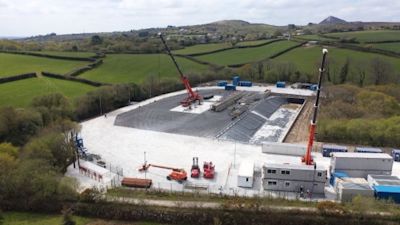Geothermal testing restarts at Eden Project after mini earthquake felt in Cornwall

Geothermal testing has restarted at the Eden Project near St Austell following a mini-earthquake is the surrounding area.
Work was temporarily stopped after people up to three miles away from the site felt their homes shaking on Wednesday 9 March.
The testing is part of a £17million drilling project to generate geothermal heat and power.
The process sees water pumped down to hot rocks beneath the surface of the Earth in order to 'superheat' it.
Eden Geothermal, which runs the project, says it is restarting operations after reviewing its testing programme.
In a statement, it said: "We know that some people want to better understand what caused the felt seismicity last Wednesday. Microseismicity is linked to well testing during the early stages of any deep geothermal development.
"This is because even low injection volumes and flow rates cause tiny movements along the natural fractures in the rock very deep underground. Normally, the events generated are far too small to be felt, or heard, at the surface.
"But occasionally an event is felt or heard. This doesn’t mean that felt events like the one last Wednesday are dangerous. Relatively small seismic events can be felt or heard, but they would need to be much bigger to cause cosmetic damage to buildings, or to be dangerous."
The process has been compared by some to fracking, the controversial technique for releasing shale gas, but those behind the project at Eden say there are some differences.
Augusta Grand from Eden Geothermal explains how Geothermal drilling differs from fracking
Executive Director Augusta Grand said: "The thing about fracking is it's used for releasing fossil fuels and we are doing exactly the opposite to that. We are trying to get the UK off gas and off fossil fuels, so that's the first thing.
"It does use similar techniques to the extent that we are injecting water into the natural fractures down below, but we're doing much, much deeper. We're doing it at much, much lower pressures.
"There's absolutely no risk of ground water contamination, or anything like that, from fossil fuels, because there aren't any fossil fuels down there."